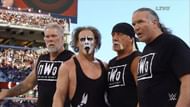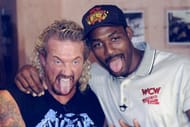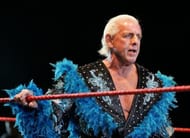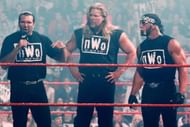Few people have worked with as many professional wrestling legends as Eric Bischoff. Going a step further, few people have as much experience as Bischoff when it comes to working at the top level of the wrestling business.
Beyond his work as a broadcaster for AWA and an on-screen authority figure for WWE, Bischoff ran the show at WCW and TNA at different points, ultimately being responsible for many of the top wrestling storylines and signings in history.
Last year, Bischoff's podcast Bischoff On Wrestling disappeared with little notice. It was unclear whether the show was on hiatus due to Bischoff's busyness with other projects, or if he was changing podcast networks as some of his peers had recently done.
Fortunately, this week Bischoff On Wrestling returned with new co-host -- Something To Wrestle With Bruce Prichard sidekick Conrad Thompson -- on the MLW Network for its first new episode in over six months.
WWE has no plans for these former AEW wrestlers? Here's why!
The aim of the episode was to give the history of the New World Order faction, finally answering many of the questions and controversies which Bischoff has felt to be misinterpreted over the years.
The episode, as titled "Creating The nWo" is slightly over two and a half hours in length. As an appetizer for what to expect for the conversation between Bischoff and Thompson, here are just four of the things which I learned as a result of listening to the episode.
#1: The nWo concept was not stolen from Japan

Perhaps the most successful pro wrestling angle of the 1990s was the New World Order's "invasion" of WCW. Over the years, many critics have assumed that Bischoff lifted the concept of the nWo from Japan. Specifically, that Bischoff modified the concept of the nWo from UWF International's invasion of New Japan Pro Wrestling.
Bischoff specifically dispelled this by saying that he did not base the nWo off of that angle, but he was influenced by Japanese wrestling's inclusion of more reality-based storytelling.
He claims to have been unaware of that storyline, even though he had been spending extended periods of time in Japan during that particular era of running WCW as its Executive Producer.
It must also be noted that the UWFI lost most of its matches when invading New Japan, which is quite different than the nWo's long-term success with championships.
#2: Diamond Dallas Page is largely to credit for the success of WCW in the 1990s

When you think of Diamond Dallas Page within the context of WCW, you probably think of an on-screen performer who won the Heavyweight Championship several times. You may also think of DDP's on-screen valet and then real-life wife Kimberly.
If you are someone who listens to a lot of wrestling history-related podcasts and/or has read "the dirtsheets," you probably know that DDP was close with Eric Bischoff long before he became a main-eventer within WCW.
Another one of DDP's long-time friends in the wrestling business is Scott Hall, who was featured in the Resurrection Of Jake The Snake documentary. DDP and Hall had worked together in WCW in the early 1990s, prior to Hall's success in WWF as Razor Ramon.
When Hall had decided that it was time to consider leaving WWF, he had used DDP as a middleman to talk to Bischoff. DDP, who lived several houses from Bischoff, made the direct suggestion to Bischoff that Hall was ready to talk business.
Kevin Nash, while friendly with DDP, was part of a separate deal. Bischoff said within the podcast that he knew Nash better than he had Hall prior to negotiating the deal, and he met with Nash directly.
#3: A lot of the contract numbers you have been hearing are not true.

When you listen to a history-oriented podcast with Conrad Thompson, you can expect to hear Thompson -- a successful company owner of a financial company -- to ask about dollar amounts and contract terms.
Thompson's co-host on the Something To Wrestle With podcast, Bruce Prichard, generally steers away from those sorts of numbers. Bischoff, however, does not and shared numbers to the best of his recollection.
Hulk Hogan aside, Sting was the highest-paid WCW talent at the time in which Bischoff was negotiating with Scott Hall and Kevin Nash. Sting was said to be earning around $750,000 per year. Ric Flair was earning around $500,000.
Bischoff did not want to pay Hall as much as Sting or Hogan, instead guaranteeing around $500,000 for the first year. Bischoff insists that Nash did not make the $780,000 for his first year in WCW which he has talked about.
He added that he generally did not need approval to hire and fire talent so long as he stayed within his budget. However, Hogan was the rare exception as that required approval and extra funding from Turner.
#4: Scott Hall and Kevin Nash did not have the first guaranteed contracts of WCW.

Critics of WCW often like to point out that the company was careless with its spending when it came to hiring new talent. Oftentimes, that logic also ties into blaming Eric Bischoff for providing minimally-used WCW talent with guaranteed contracts.
That subject may also lead into discussion about how WCW changed its business model to accommodate Hall and Nash, giving them the first guaranteed WCW contracts.
Bischoff disputed this on all ends. He explained how he himself, as a low-level WCW broadcaster, had a guaranteed contract. He told an anecdote about Larry Zbyszko having a guaranteed contract in that same era.
Thompson added that The Midnight Express, outside of WCW, had guaranteed contracts. The bottom line is that Hall and Nash were not the first WCW-signed wrestlers to be promised money even if not working dates.
This led to further discussion about Most Favored Nations -- or "MFN" -- clauses, and how that often played into signing top talent. Furthermore, how particular wrestlers used agents for their contract negotiations, which influenced what other performers might get.
Send us news tips at fightclub@sportskeeda.com
How WWE has messed up John Cena's last run - Check here!

